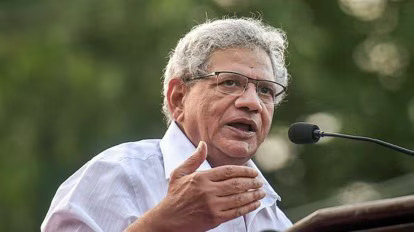Rehan Khan
Sitaram Yechury, the General Secretary of the Communist Party of India (Marxist), passed away on 11th September at the age of 72 after battling a prolonged illness. Yechury, a stalwart of Indian politics, breathed his last at AIIMS, New Delhi, where he had been undergoing treatment for an acute respiratory infection since August 19, 2024. His demise has left a void in Indian politics, with leaders across the spectrum mourning the loss of a leader who had dedicated his life to the cause of secularism, social justice, and Marxist ideology.
Tributes poured in from political allies and opponents alike. Congress leader Rahul Gandhi hailed him as a “protector of the idea of India,” while Prime Minister Narendra Modi praised Yechury’s ability to build connections across political lines. In a heartfelt tribute, West Bengal Chief Minister Mamata Banerjee acknowledged the loss as significant for national politics. Reflecting on her friendship with Yechury, Sonia Gandhi remarked, “He was uncompromising in his commitment to the values of our country’s Constitution embodied so very forcefully in its preamble.” She credited him for contributing significantly to the rise of the INDIA group ahead of the 2024 Lok Sabha elections.
The CPI(M) announced that Yechury’s body would be kept at A.K. Gopalan Bhavan, the party headquarters, for public homage before being donated to AIIMS for medical research, as per his wishes.
Yechury’s political career spanned decades, beginning with his involvement in student politics in the 1970s. A close associate of the late Harkishan Singh Surjeet, Yechury played a crucial role in the coalition politics of the National Front and the United Front governments during the 1990s. His sharp political acumen came to the fore when he succeeded Prakash Karat as the CPI(M) General Secretary in 2015. Yechury was known for skillfully navigating the party through internal challenges and evolving political landscapes.
One of Yechury’s most notable contributions was during the United Progressive Alliance (UPA) government’s first term, where he and his party played a significant role in shaping policy decisions, particularly in their opposition to the Indo-US nuclear deal. This opposition culminated in the Left withdrawing support from the UPA government, marking a pivotal moment in Indian political history. Despite the eventual fallout, Yechury remained a consistent voice for the Left, advocating for workers’ rights, social justice, and a pluralistic India.
Yechury’s dedication to Marxist ideology also underscored his role in advancing communism in India, particularly through his efforts to align the CPI(M)’s policies with the changing global and national dynamics. His ability to adapt to the shifting political climate, while staying rooted in communist principles, made him a unique leader within the Left.
As the nation mourns his passing, Sitaram Yechury’s contributions to Indian politics and his steadfast commitment to secularism, justice, and equality will be remembered as a significant chapter in the history of Indian communism.

